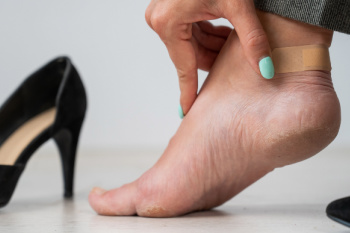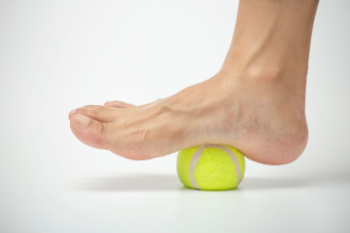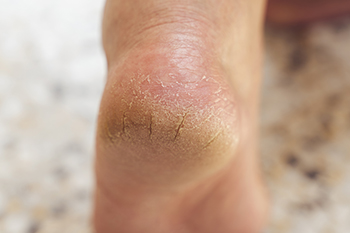
Blisters between the toes can disrupt comfort and mobility. They are often caused by friction from wearing ill-fitting shoes or excessive moisture. Symptoms can include a painful, fluid-filled sac that may burst if not treated promptly, leading to infection or further irritation. Proper wound care starts with cleaning the area gently with mild soap and water, followed by applying a sterile bandage to protect it from further friction. Avoid popping blisters, as it can increase infection risk. Moisturizing the surrounding skin and wearing well-fitting, breathable footwear can help to prevent recurrence. For persistent blisters or signs of infection such as redness, swelling, or pus, it is important to seek professional care from a podiatrist. They can provide tailored treatment, such as antibiotic ointments or specialized dressings, ensuring proper healing and minimizing future complications. Do not ignore blisters. Consider scheduling an appointment with a podiatrist for an expert evaluation and care to keep your feet healthy and pain-free.
Blisters are prone to making everyday activities extremely uncomfortable. If your feet are hurting, contact one of our podiatrists of Advanced Ankle & Foot Surgeons. Our doctors can provide the care you need to keep you pain-free and on your feet.
Foot Blisters
Foot blisters develop as a result of constantly wearing tight or ill-fitting footwear. This happens due to the constant rubbing from the shoe, which can often lead to pain.
What Are Foot Blisters?
A foot blister is a small fluid-filled pocket that forms on the upper-most layer of the skin. Blisters are filled with clear fluid and can lead to blood drainage or pus if the area becomes infected.
How Do Blisters Form?
Blisters on the feet are often the result of constant friction of skin and material, usually by shoe rubbing. Walking in sandals, boots, or shoes that don’t fit properly for long periods of time can result in a blister. Having consistent foot moisture and humidity can easily lead to blister formation.
Prevention & Treatment
It is important to properly care for the affected area in order to prevent infection and ease the pain. Do not lance the blister and use a Band-Aid to provide pain relief. Also, be sure to keep your feet dry and wear proper fitting shoes. If you see blood or pus in a blister, seek assistance from a podiatrist.
If you have any questions, please feel free to contact our office located in O'Fallon, IL . We offer the newest diagnostic and treatment technologies for all your foot care needs.

Exercising your feet offers numerous benefits that can enhance your overall foot health, reduce pain, and keep you active. Gentle stretches and strength exercises improve flexibility and strengthen the muscles that support your feet, which can help prevent injuries and alleviate discomfort. For example, toe raise, point, and curl exercises can get your toes and feet moving, while toe splay movements help gain control over your toe muscles. Toe extensions are particularly beneficial for preventing or treating plantar fasciitis. Additionally, activities like toe curls, marble pickups, and big toe stretches strengthen various muscles in your feet and improve their range of motion. Rolling a tennis ball under your foot can also provide relief from arch pain and plantar fasciitis. Finally, Achilles tendon stretches help maintain flexibility while preventing foot, ankle, and leg pain. You can perform these foot exercises three days a week or even daily for lifelong foot health. If you have any injuries, arthritis, diabetes, or persistent foot and ankle pain, consult a foot doctor before starting any new exercise routine. It is suggested that you schedule an appointment with a podiatrist for an exam and expert treatment.
Exercising your feet regularly with the proper foot wear is a great way to prevent injuries and build strength. If you have any concerns about your feet, contact one of our podiatrists from Advanced Ankle & Foot Surgeons. Our doctors can provide the care you need to keep you pain-free and on your feet.
Exercise for Your Feet
Exercise for your feet can help you gain strength, mobility and flexibility in your feet. They say that strengthening your feet can be just as rewarding as strengthening another part of the body. Your feet are very important, and we often forget about them in our daily tasks. But it is because of our feet that are we able to get going and do what we need to. For those of us fortunate enough to not have any foot problems, it is an important gesture to take care of them to ensure good health in the long run.
Some foot health exercises can include ankle pumps, tip-toeing, toe rises, lifting off the floor doing reps and sets, and flexing the toes. It is best to speak with Our doctors to determine an appropriate regimen for your needs. Everyone’s needs and bodies are different, and the activities required to maintain strength in the feet vary from individual to individual.
Once you get into a routine of doing regular exercise, you may notice a difference in your feet and how strong they may become.
If you have any questions please feel free to contact our office located in O'Fallon, IL . We offer the newest diagnostic and treatment technologies for all your foot and ankle needs.
 Diabetes, a chronic condition marked by high blood sugar levels, can significantly affect foot health, leading to complications such as cracked heels. Diabetes impairs circulation and causes neuropathy, which reduces sensation in the feet. This lack of sensation makes it harder to notice dry skin and small cracks, allowing them to worsen unnoticed. Cracked heels occur when the skin surrounding the heels becomes dry and thickens, leading to fissures that can be painful and prone to infection. Poor blood circulation in diabetic patients further hampers the healing process, increasing the risk of complications. To prevent and treat cracked heels, maintain proper foot hygiene and moisturize daily, focusing on the heels. Avoid soaking feet too long, as this can dry out the skin further. Wear supportive, well-fitting shoes to reduce pressure on the heels, and regularly inspect feet for cracks or sores. For persistent or severe cases of cracked heels, it is suggested that you seek the counsel of a podiatrist who can provide specialized care and recommend appropriate treatments.
Diabetes, a chronic condition marked by high blood sugar levels, can significantly affect foot health, leading to complications such as cracked heels. Diabetes impairs circulation and causes neuropathy, which reduces sensation in the feet. This lack of sensation makes it harder to notice dry skin and small cracks, allowing them to worsen unnoticed. Cracked heels occur when the skin surrounding the heels becomes dry and thickens, leading to fissures that can be painful and prone to infection. Poor blood circulation in diabetic patients further hampers the healing process, increasing the risk of complications. To prevent and treat cracked heels, maintain proper foot hygiene and moisturize daily, focusing on the heels. Avoid soaking feet too long, as this can dry out the skin further. Wear supportive, well-fitting shoes to reduce pressure on the heels, and regularly inspect feet for cracks or sores. For persistent or severe cases of cracked heels, it is suggested that you seek the counsel of a podiatrist who can provide specialized care and recommend appropriate treatments.
Cracked heels are unsightly and can cause further damage to your shoes and feet. If you have any concerns, contact one of our podiatrists from Advanced Ankle & Foot Surgeons. Our doctors can provide the care you need to keep you pain-free and on your feet.
Cracked Heels
Cracked heels appear unappealing and can make it harder for you walk around in sandals. Aside from looking unpleasant, cracked heels can also tear stockings, socks, and wear out your shoes. There are several methods to help restore a cracked heel and prevent further damage.
How Do You Get Them?
Dry skin is the number one culprit in creating cracked heels. Many athletes, walkers, joggers, and even swimmers suffer from cracked heels. Age and skin oil production play a role to getting cracked heels as well.
Promote Healing
Over the counter medicines can help, especially for those that need instant relief or who suffer from chronic dry feet.
Wear Socks – Wearing socks with medicated creams helps lock in moisture.
Moisturizers – Applying both day and night will help alleviate dryness which causes cracking.
Pumice Stones – These exfoliate and remove dead skin, which allows for smoother moisturizer application and better absorption into the skin.
Change in Diet
Eating healthy with a well-balanced diet will give the skin a fresh and radiant look. Your body responds to the kinds of food you ingest. Omega-3 fatty acids and zinc supplements can also revitalize skin tissue.
Most importantly, seek professional help if unsure how to proceed in treating cracked heels. A podiatrist will help you with any questions or information needed.
If you have any questions, please feel free to contact our office located in O'Fallon, IL . We offer the newest diagnostic and treatment technologies for all your foot care needs.